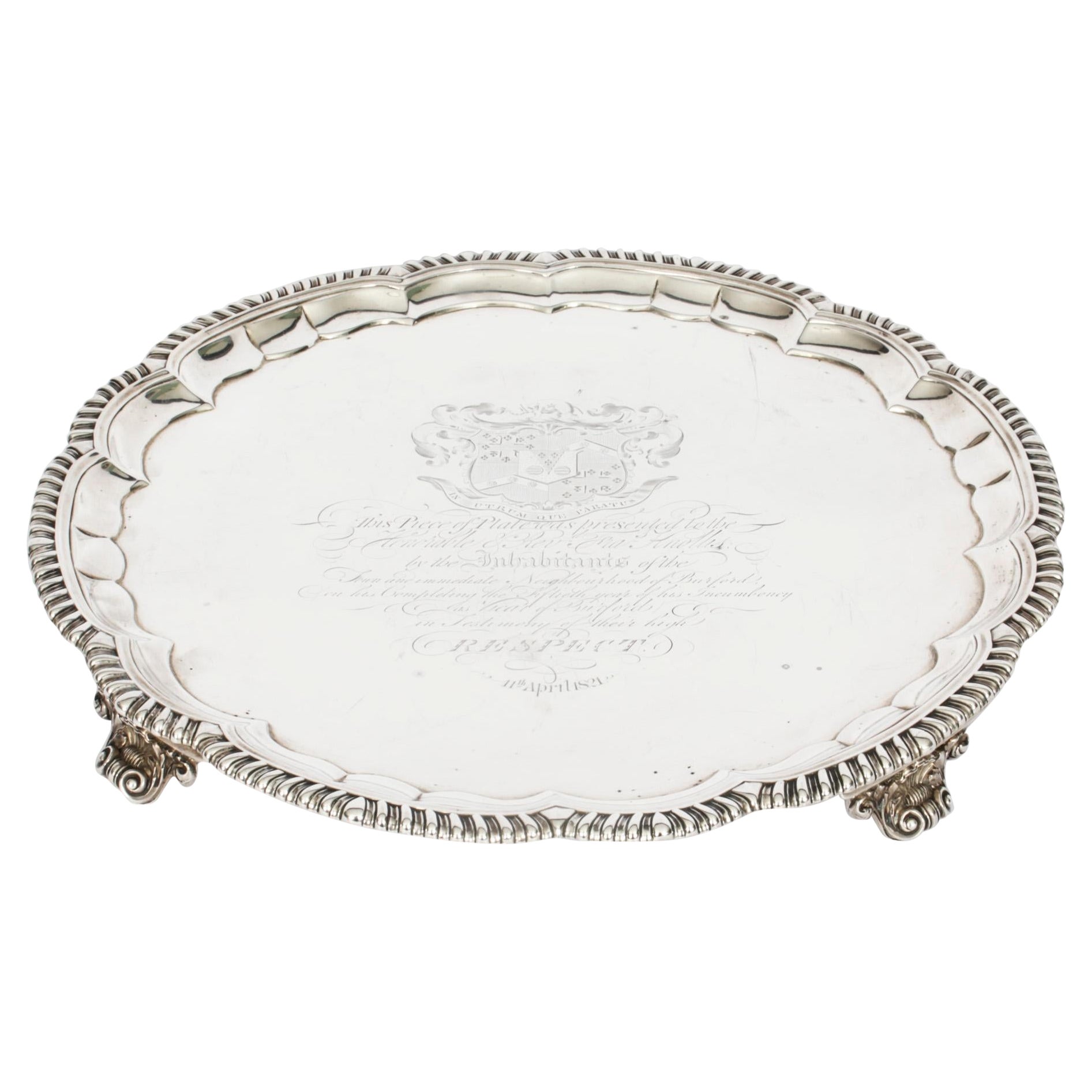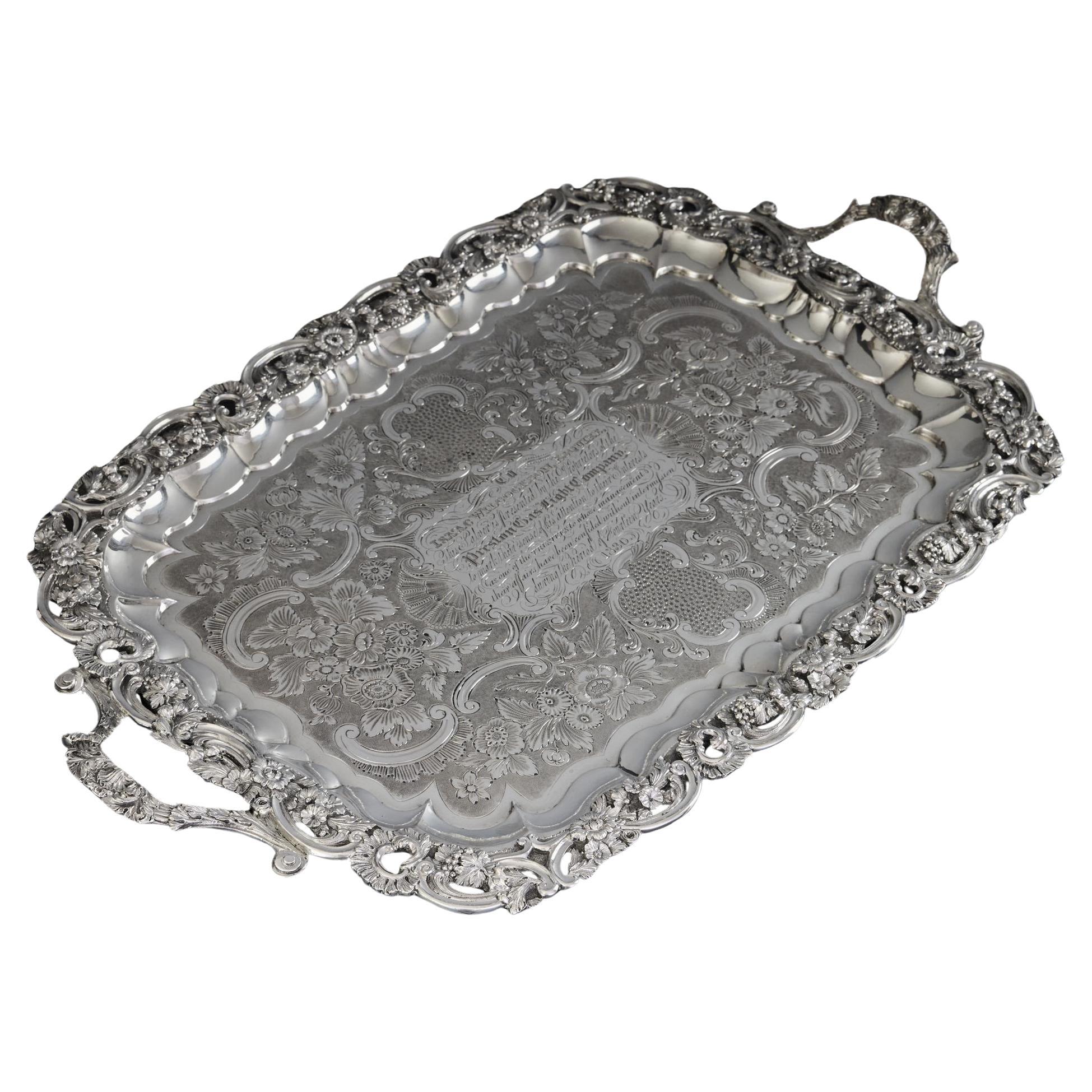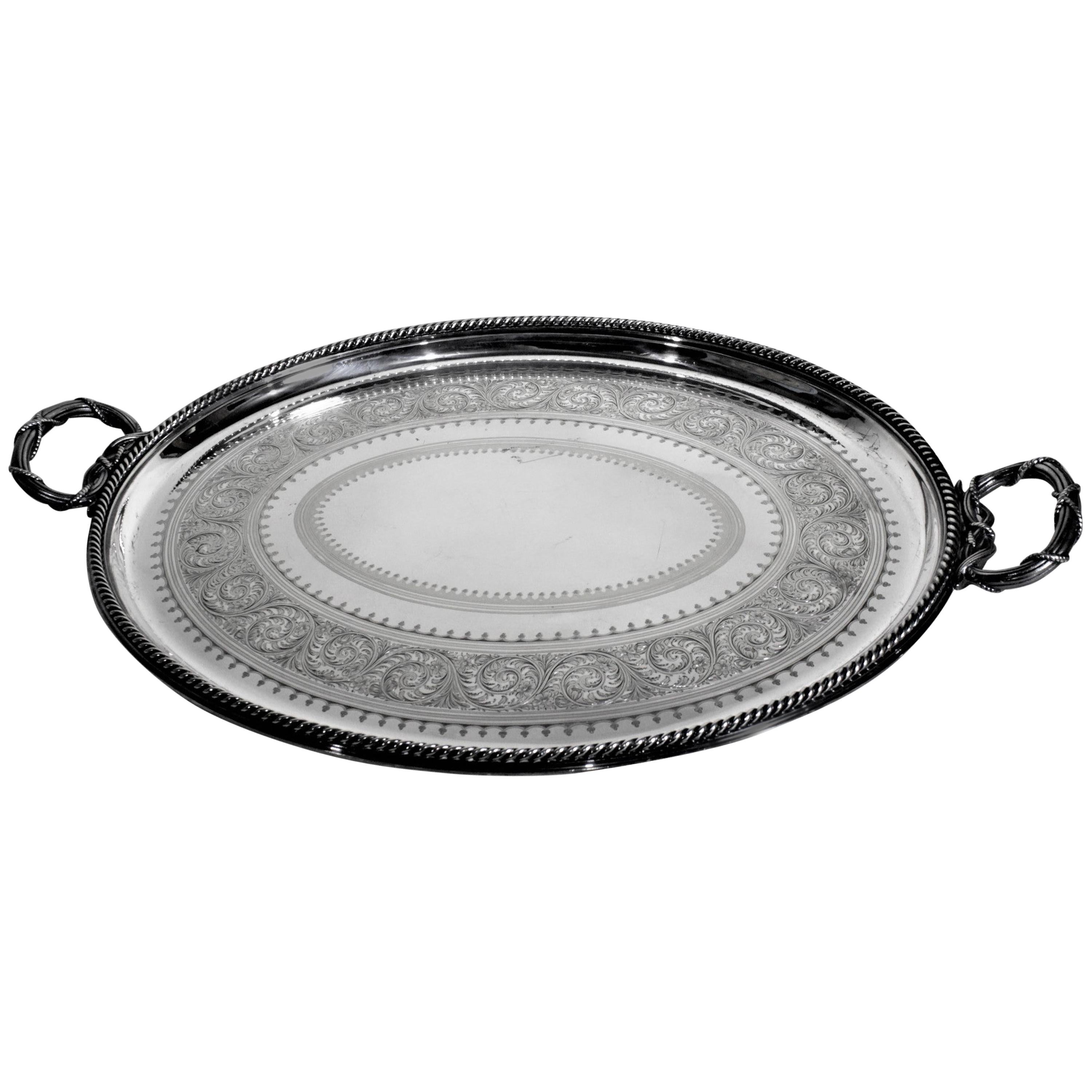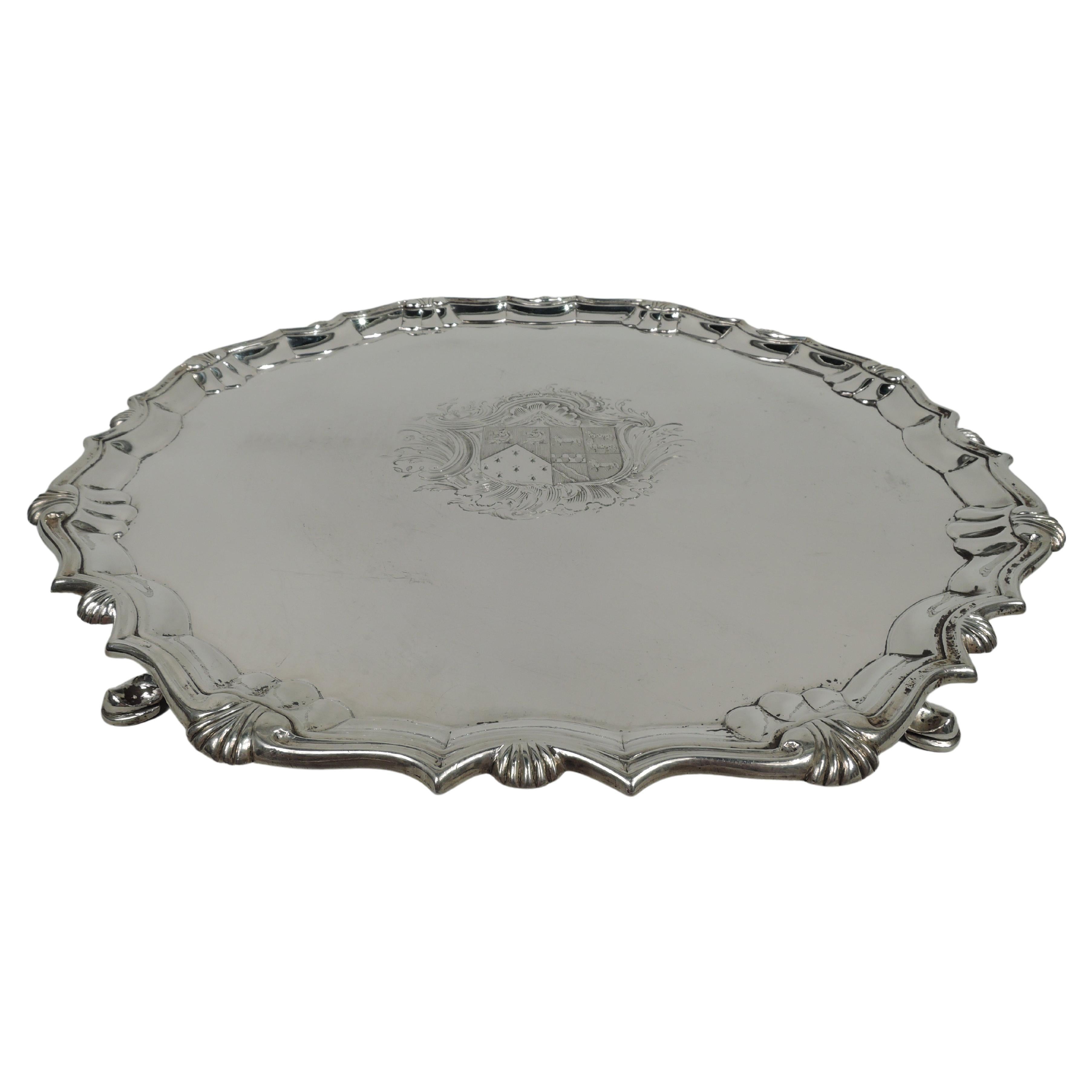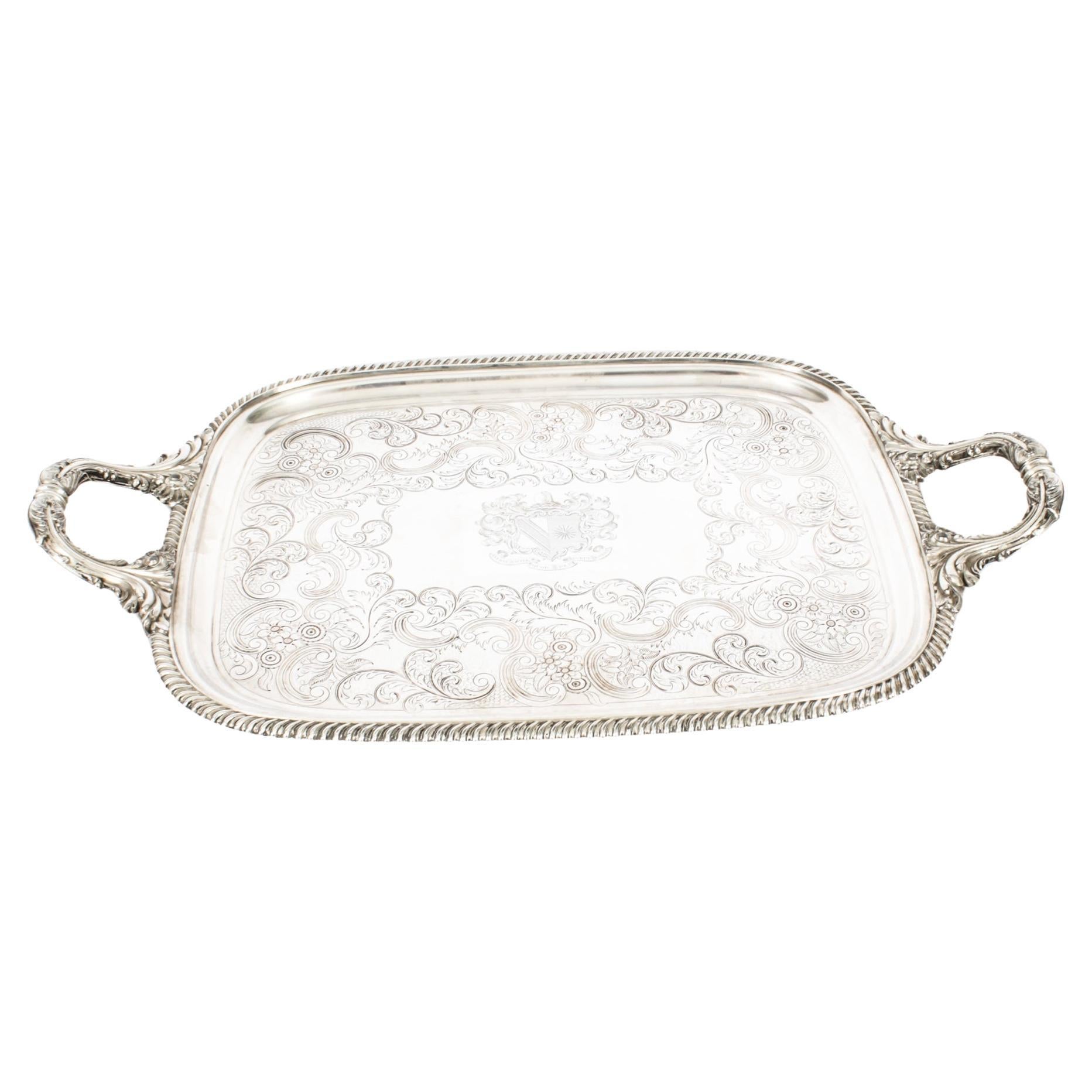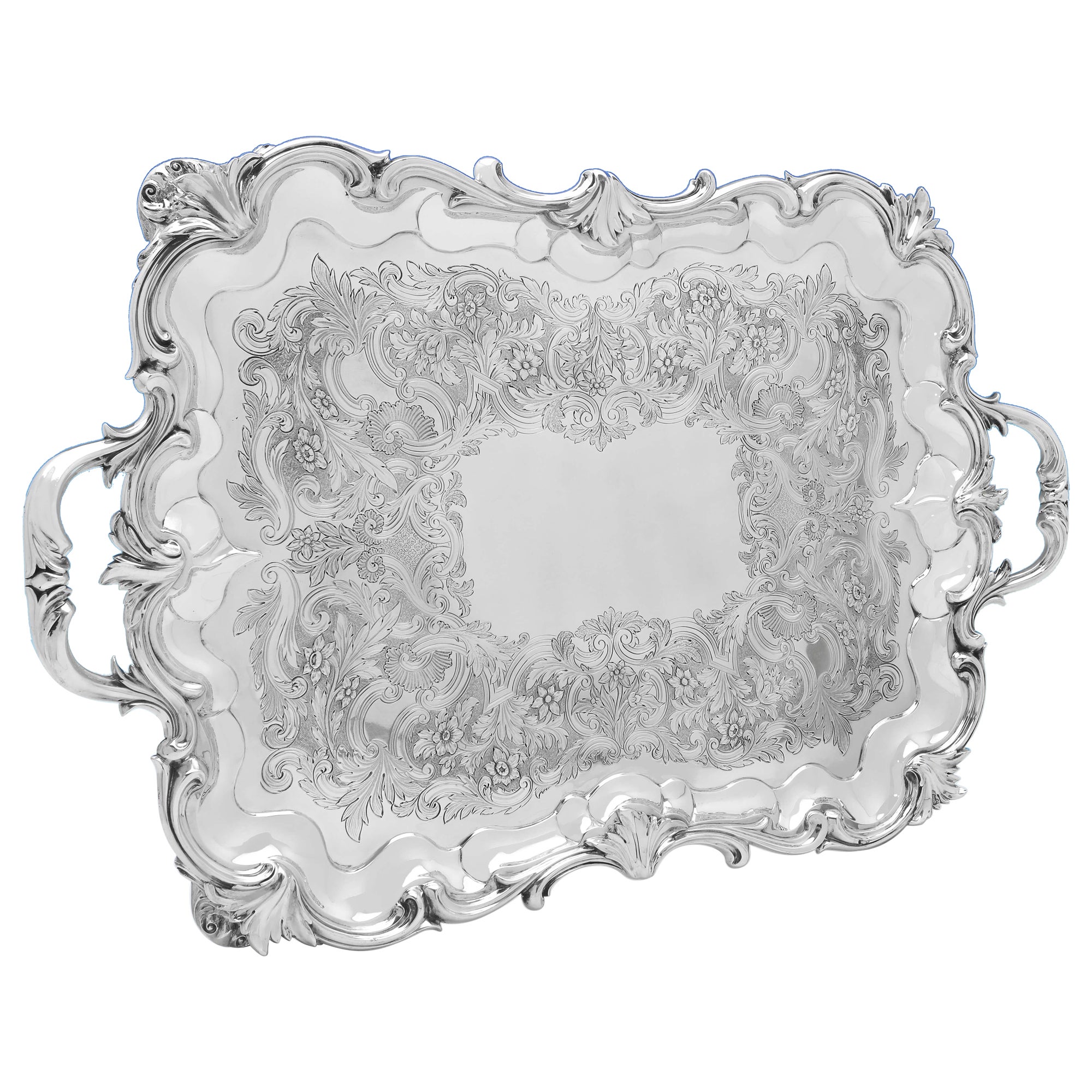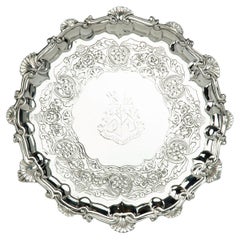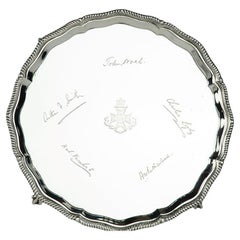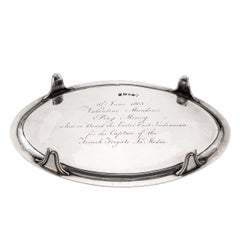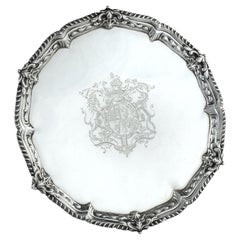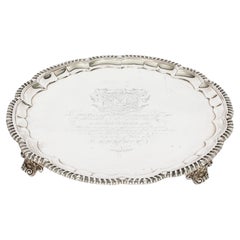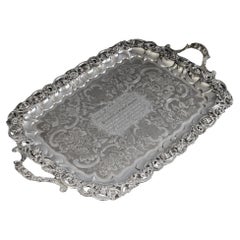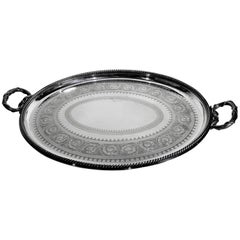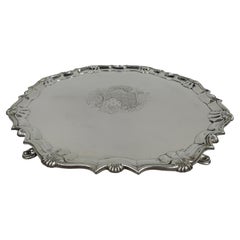Items Similar to A Victorian silver armorial tray presented to Brig. General Sir Bertram Portal
Want more images or videos?
Request additional images or videos from the seller
1 of 5
A Victorian silver armorial tray presented to Brig. General Sir Bertram Portal
$1,752.83
£1,275
€1,493.69
CA$2,443.73
A$2,649.50
CHF 1,396.28
MX$32,220.56
NOK 17,371.98
SEK 16,428.07
DKK 11,151.26
About the Item
A Victorian silver armorial tray presented to Brig. General Sir Bertram Portal, 17th Lancers, of rounded form with a bracketed, gadrooned rim with eight scallop shells, raised on three feet, incised with a central armorial on the front and on the reverse ‘Presented to Capt. Portal, 17th Lancers, on his marriage April 12th 1899 by the servants of Malshanger’. Marks for, Charles Boyton, London 1898.
This lot is accompanied by a book on this great man by Richard Waldram. ‘Brigadier General Sir Bertram Portal, 1866-1949’, 28th November, 2021.
Footnote: The arms are for Portal impaling Littleton for Brig. General Sir Bertram Percy Portal, KCB, DSO (1866 – 1949) who married Hon. Margaret Louisa Littleton (1869-1945) on the 12th of April 1899. Sir Bertram was educated at Wellington College, Crowthorne and at the Royal Military College, Sandhurst, Berkshire. In 1885 he gained the rank of officer in the 17th Lancers. He held the office of Aide-de-Camp to the Governor of Madras between 1896 and 1898. He fought in the Boer War between 1899 and 1902, where he was mentioned in despatches and awarded the South African Medal with three clasps and the King’s Medal with two clasps. He was awarded the Distinguished Service Order (D.S.O.) in 1902. He was Lieutenant-Colonel and Brevel Colonel of the 17th Lancers between 1903 and 1907. He held the office of Deputy Lieutenant (D.L.) of Hampshire. He fought in the First World War, where he was mentioned in despatches. He was Commander of the of the Cavalry Brigade between 1916 and 1918. He gained the rank of Honorary Brigadier-General in 1919. He was chairman of the Hampshire and Isle of Wight Territorial Army Association between 1925 and 1938 and held the office of County Councillor (C.C.) for Hampshire between 1932 and 1942. He was appointed Knight Commander, Order of the Bath (K.C.B.) in 1937.
- Creator:Charles Boyton (Maker)
- Dimensions:Height: 1.25 in (3.18 cm)Diameter: 8 in (20.32 cm)
- Style:Victorian (Of the Period)
- Materials and Techniques:
- Place of Origin:
- Period:
- Date of Manufacture:1898
- Condition:Wear consistent with age and use.
- Seller Location:Lymington, GB
- Reference Number:1stDibs: LU973038262532
About the Seller
5.0
Recognized Seller
These prestigious sellers are industry leaders and represent the highest echelon for item quality and design.
Established in 1982
1stDibs seller since 2013
135 sales on 1stDibs
Typical response time: 2 hours
Associations
LAPADA - The Association of Arts & Antiques Dealers
- ShippingRetrieving quote...Shipping from: Lymington, United Kingdom
- Return Policy
Authenticity Guarantee
In the unlikely event there’s an issue with an item’s authenticity, contact us within 1 year for a full refund. DetailsMoney-Back Guarantee
If your item is not as described, is damaged in transit, or does not arrive, contact us within 7 days for a full refund. Details24-Hour Cancellation
You have a 24-hour grace period in which to reconsider your purchase, with no questions asked.Vetted Professional Sellers
Our world-class sellers must adhere to strict standards for service and quality, maintaining the integrity of our listings.Price-Match Guarantee
If you find that a seller listed the same item for a lower price elsewhere, we’ll match it.Trusted Global Delivery
Our best-in-class carrier network provides specialized shipping options worldwide, including custom delivery.More From This Seller
View AllA George IV crested silver tray commemorating the marriage Colonel Thomas Arthur
Located in Lymington, Hampshire
A George IV crested silver tray commemorating the marriage of Lieutenant Colonel Thomas Arthur, 3rd Dragoon Guards, of circular form, raised upon three ...
Category
Antique Early 19th Century English George IV Platters and Serveware
Materials
Silver
A George V silver presentation salver for The King’s Royal Rifle Corps
By Goldsmiths & Silversmiths Co. Ltd.
Located in Lymington, Hampshire
A George V silver presentation salver for The King’s Royal Rifle Corps, (60th Regiment of Foot), of circular form with a gadrooned border, raised on four claw and ball feet, the centre with a regimental badge with a Peninsula War...
Category
Early 20th Century English Tableware
Materials
Silver
Valentine Munden’s Prize Money Silver Salver, London, 1792
Located in Lymington, Hampshire
This small oval George III silver salver is raised on four scroll feet with a plain field and curvetto within a triple reed border. The reverse is engraved ‘June 18th 1803 Valentine Munden’s Prize Money when on board the Exeter East Indiaman for the Capture of the French Frigate La Medée.’ Maker’s mark of John Crouch & Thomas Hannam, London 1792.
The naval action took place on the 4th of August 1800 off the coast of Brazil. On that morning, the Royal Navy escort, Belliqueux sighted a squadron of French frigates and, giving chase, captured the largest ship La Concorde whilst the East Indiamen, Exeter and Bombay Castle pursued and took the surrender of La Medée. The Coutts and Neptune were unsuccessful in capturing a third frigate La Franchaise, but the action stands out as the only occasion during the Napoleonic Wars when a merchant vessel captured a French ship of war...
Category
Antique 1790s English Sterling Silver
Materials
Silver
Presentation silver to the Master Shipwright of Captain Cook’s Endeavour
Located in Lymington, Hampshire
A George III shaped circular silver salver, plain within a shell and scrolling wave border and outer gadrooned edge, engraved with the royal coat of arms, crest and motto (period 1714-1800) of King George III and, on the reverse with a presentation inscription: For the Launching of His Majestys sloop ‘Otter’ 14 Gunns 305 Tonns 26 October 1767 & His Majestys ship ‘Egmont’ 74 Gunns 1643 Tonns 29 August 1768 by Mr Adam Hayes Master Shipwright of his Majestys yard at Deptford; further monogrammed A*H P A*M. Hallmarked for Benjamin Cartwright, London, 1769
Adam Hayes (1710-1785) began his career as ship’s carpenter in Centurion during Commodore Anson’s famous voyage around the world...
Category
Antique 1760s English George III Nautical Objects
Materials
Silver
A George V silver double inkstand presented to Major Seymour Egerton
Located in Lymington, Hampshire
A George V silver double inkstand presented to Major Seymour Egerton, Coldstream Guards, by Prince Arthur Duke of Connaught & Strathearn, of rectangular fo...
Category
Early 20th Century English Inkwells
Materials
Silver
A Victorian Silver Inkstand made in Madras by Peter Orr and Sons in 1880
Located in Lymington, Hampshire
A Victorian Silver Inkstand made in Madras by Peter Orr and Sons in 1880 for Presentation to the 3rd Duke of Buckingham and Chandos, Governor of Madras and Convenor of the “Duke’s Ow...
Category
Antique Late 19th Century English Victorian Inkwells
Materials
Silver
You May Also Like
Antique Large William IV Silver Tray Salver by Paul Storr 19th Century
By Paul Storr
Located in London, GB
This is a wonderful English antique William IV sterling silver tray, or salver, by the world famous silversmith Paul Storr.
It has clear hallmarks for London 1820 the makers mark of Paul Storr.
It is typical of his work with the octafoil shape and the exquisitely detailed reeded rim, and it is raised on four delightful foliate and scroll feet.
The centre is engraved with a shield shaped coat of arms which I have had researched.
The Marital Arms of Knollis and Hallifax
The armorial bearings as engraved upon this George IV Large English Sterling Silver Footed Salver by Paul Storr hallmarked London 1820 are those of the family of Knollis with Hallifax in pretence. These armorial bearings denote the marshalling of a marital coat showing the arms of the husband over the entire surface of the shield, whilst the arms of the wife (as an heraldic heiress) are placed on a small shield (known as an escutcheon of pretence) centrally on the husband’s arms.
They may be blazoned as follows:
Arms:
Quarterly 1st and 4th Azure crusily of cross crosslets a cross moline voided or (for Knollys) 2nd and 3rd Gules on a chevron argent three roses of the field barbed proper (for Knollys) over all an escutcheon of pretence Or on a pile engrailed sable between two fountains barry wavy of six argent and azure three cross crosslets of the first (for Hallifax)
Crest:
An elephant argent [differenced with a mullet1 ] (for Knollys)
Motto:
In utrumque paratus [Prepared for either] (for Knollys)
These armorial bearings undoubtedly commemorate the marriage of The Honourable and Reverend Francis Knollis2 (baptised 3rd January 1743 died 27th February 1826),
1 The cadency mark for a third son of a family. 2 Francis appears to have preferred this spelling of his family’s surname. It is spelt as it is to be pronounced.
of Burford in the County of Oxfordshire and of Eastleach Martin in the County of Gloucestershire and Mary Hallifax (baptised 5th March 1753 buried 18th December 1830). Francis and Mary were married at the Parish Church of St Mary, Ewell in the County of Surrey on the 9th June 1772. Francis was the third son of Charles Knollys (the titular 5th Earl of Banbury) 3 and his wife, Martha Hughes, whilst Mary was the daughter of The Reverend James Hallifax, of Ewell aforesaid and his wife, Elizabeth Chardavoyn.
3 Francis’s father claimed to be the 5th Earl of Banbury. A claim that continued to be pursued by the family until William Knollys, the titular 8th Earl of Banbury (born 1763 died 1834) was forced to discontinue its use by a resolution of the House of Lords which rejected his claim to the earldom in 1813.
The crest surmounts a detailed dedication:
This piece of plate was presented to the Honourable Rev Knolls by the inhabitants of the town and immediate neighbourhood of Burford on his completing the fiftieth year of his incumbency as the vicar of Burford.
In testimony of their high respect 11th April 1821
There is no mistaking its unique quality and design, which is sure to make it a treasured piece by any discerning collector.
Condition:
In excellent condition with clear hallmarks and no dings, dents or signs of repair. Please see photos for confirmation.
Dimensions in cm:
Height 3 x Width 36 x Depth 36
Weight 1.52 kg
Dimensions in inches:
Height 1 inch x Width 1 foot, 2 inches x Depth 1 foot, 2 inches
Weight 49 troy oz
Paul Storr
born in London England in 1771, was to become one of the most talented silversmiths of the nineteenth century. Today his legacy of exceptionally well crafted silver, found worldwide in museums and private collections, leaves one in awe when compared to that of his contemporaries.After having served a seven year apprenticeship from the age of 14, he began his career in 1792 when he went into a brief partnership with William Frisbee. This did not last and in 1793 a new mark, (his initials ‘P S’) was entered. By the beginning of the nineteenth century he had established himself as one of London’s top silversmiths producing, amongst others, commissions for Royalty.
In 1801 he married Elizabeth Susanna Beyer with whom he was to have ten children. In 1807 Paul Storr entered into a working relationship with Philip Rundell and by 1811 was a partner, and managing the workshops for Rundell, Bridge & Rundell.
During this period he kept his own marks and separate workshop. However it was through Rundell, Bridge & Rundell who were appointed Goldsmith in Ordinary to George III in 1804 that his reputation as a master silversmith grew. His talents lay in being able to transform ideas and designs from Rundell, Bridge & Rundell’s designers, William Theed...
Category
Antique 1820s English William IV Sterling Silver
Materials
Sterling Silver
William IV period antique sterling silver serving tray
By Richard William Atkins & William Nathaniel Somersell
Located in London, GB
Superb quality and highly decorative two-handled antique silver tray. Fitted with two cast scroll, leaf and scallop shell pattern handles, an applied cast border decorated with intri...
Category
Antique 1830s British Victorian Serving Pieces
Materials
Sterling Silver
Antique English Silver Plated Serving Tray with Ornate Engraving and Handles
By Elkington & Co.
Located in Hamilton, Ontario
This antique silver plated serving tray was made by the Elkington & Co. of England in circa 1890 in the period Victorian style. The tray has a nicely engraved outer band with a swirl...
Category
Antique Late 19th Century English Victorian Sheffield and Silverplate
Materials
Metal
English Georgian Sterling Silver Salver Tray by Abercromby
By Robert Abercromby
Located in New York, NY
George II sterling silver salver. Made by Robert Abercromby in London 1741. Molded scroll and shell rim and 4 scroll-mounted hoof supports. Armorial engraved in well center. Great he...
Category
Antique 1740s English Georgian Sterling Silver
Materials
Sterling Silver
Antique Old Sheffield Silver Plated Tray George III 1780s
Located in London, GB
This is a superb antique English Old Sheffield Silver Plate tray Circa 1780 in date.
This rectangular Old Shefield tray features a deep set, decorative gadrooned border with elegant...
Category
Antique 1780s George III Serving Pieces
Materials
Silver Plate
Stunning & Large Victorian Sterling Silver Tray - Barnards 1838
By Edward Barnard & Sons
Located in London, London
Hallmarked in London in 1838 by Edward Barnard & Sons, this stunning, Victorian, Antique Sterling Silver Tray, features wonderful flat chased decoration to the body, an acanthus & sc...
Category
Antique 1830s English Victorian Platters and Serveware
Materials
Sterling Silver
More Ways To Browse
Wallace Sir Christopher Sterling
Arabia Ruskas
Arcoroc Plates
Bernadotte Service
Berndorf Flatware
Bing And Grondahl Mexico
Christofle Fish
Coquille Plates
Dansk Salt And Pepper
Don Shoemaker Salt And Pepper Shakers
Don Shoemaker Salt
Dutch Silver Salt
Finnish Arabia Ruska
French Coffee Bowl
Gorham Fontainebleau
Horn Carving Set
Lace Tablecloth
Meat Slicer
